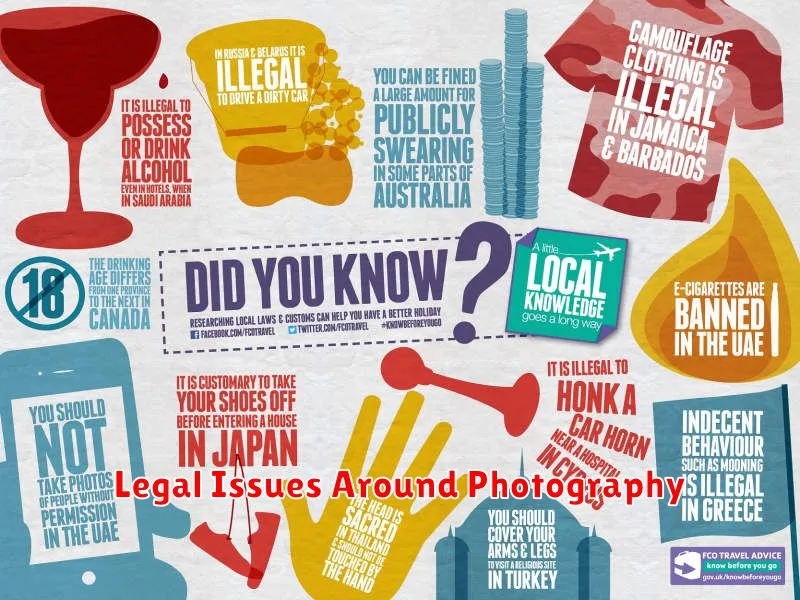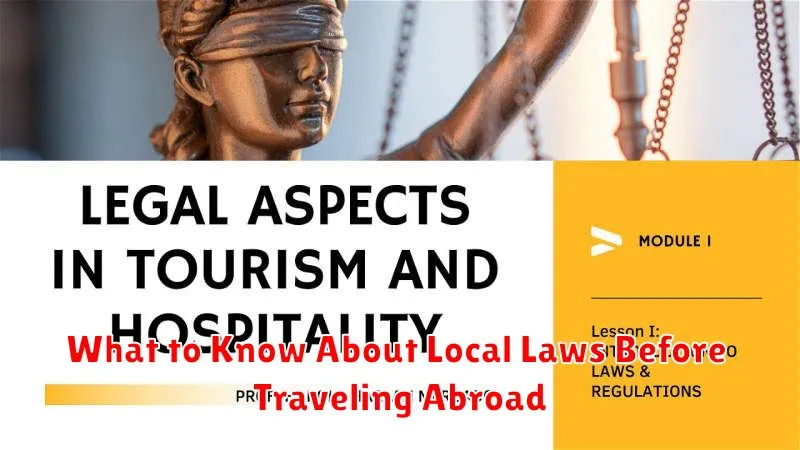Traveling abroad can be an enriching experience, offering opportunities for cultural immersion, personal growth, and unforgettable memories. However, before embarking on your international adventure, it’s crucial to familiarize yourself with the local laws of your destination. Understanding the legal landscape of a foreign country can help you avoid potential legal issues, ensuring a smooth and enjoyable trip. From visa requirements and customs regulations to driving laws and social etiquette, researching local laws is a vital part of pre-trip planning. This article will equip you with the essential knowledge you need to navigate the local laws of your chosen destination, allowing you to travel with confidence and peace of mind. Knowing the local laws before traveling abroad is not just a recommendation, it’s a necessary step for responsible travel.
Failing to research and comply with local laws can lead to a range of consequences, from minor inconveniences like fines to more serious repercussions such as imprisonment. By understanding the local laws before traveling abroad, you demonstrate respect for the host country’s culture and legal system. This article will provide you with practical advice on how to access information regarding local laws, highlighting key areas to focus on, including specific regulations related to alcohol consumption, drug use, dress codes, and public behavior. Local laws can vary significantly from your home country, so it’s essential to be prepared and informed. Being aware of the local laws before traveling abroad will empower you to navigate cultural nuances and ensure a safe and respectful journey.
Researching Country-Specific Laws
Before traveling internationally, it’s crucial to research the specific laws of your destination country. Ignorance of local laws is not a valid excuse for breaking them, and penalties can be severe.
Focus your research on areas such as visa requirements, customs regulations, and laws regarding alcohol consumption, dress codes, and drug use. These can differ significantly from your home country.
Understanding Dress Codes and Behavior
Respecting local customs is crucial when traveling abroad. Dress codes can vary significantly between cultures. Researching appropriate attire beforehand demonstrates respect and helps avoid unwanted attention.
Beyond clothing, behavior also plays a key role. Public displays of affection, certain hand gestures, or even speaking loudly can be considered offensive in some regions. Familiarizing yourself with local etiquette will enhance your travel experience and foster positive interactions.
Restrictions on Medication or Items
Before traveling internationally, research the specific regulations of your destination regarding medications and personal items. Some countries have strict rules about bringing in certain prescription or over-the-counter drugs. Ensure you have the necessary documentation, such as a doctor’s prescription, for any medication you carry.
Certain items, like vaping devices or specific types of electronics, might also face restrictions or bans. Check with the embassy or consulate of your destination country for up-to-date information on prohibited or restricted items to avoid potential legal issues.
Legal Issues Around Photography

Photography laws vary significantly between countries. Be aware of restrictions regarding photographing government buildings, military installations, and religious sites. Some countries also have laws concerning photographing individuals without their explicit consent.
Researching these regulations beforehand can prevent legal trouble and ensure a smooth trip. Ignorance of the law is not a valid defense.
Language Barriers in Legal Matters
Navigating legal issues in a foreign country can be incredibly challenging, especially when facing a language barrier. Understanding local laws and legal processes is crucial, but if you don’t speak the language, it’s nearly impossible to do so effectively.
Misunderstandings can easily arise, leading to serious consequences. Inability to communicate with legal professionals or understand legal documents can severely hinder your ability to protect your rights.
Seeking qualified legal representation fluent in both your language and the local language is essential if you find yourself in a legal situation abroad.
Knowing Embassy Locations
Before traveling internationally, it is crucial to locate your country’s embassy or consulate in your destination. Embassies and consulates provide vital assistance to citizens abroad, particularly in emergencies.
Knowing the embassy’s location and contact information can be invaluable if you experience a lost or stolen passport, require legal aid, or face a medical emergency. They can also offer guidance on local laws and customs.
Respecting Cultural Norms Legally
While cultural norms are generally understood practices, some are legally enforced. Researching these legal expectations before traveling is crucial to avoid legal repercussions.
Examples include dress code laws, restrictions on alcohol consumption, and regulations regarding public displays of affection. Ignorance of these laws is not a valid defense. Respecting local laws demonstrates respect for the culture you are visiting and ensures a smoother travel experience.

